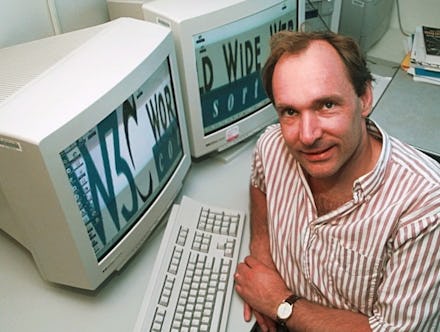The Inventor of the Web Only Wants One Thing for the Internet's 25th Birthday

The news: The Internet is turning 25 years old, and the man most credited with inventing it just wants one thing for its birthday: net neutrality.
Tim Berners-Lee (not Al Gore), who originally proposed making information sharing possible via computer networks, is widely believed to have laid the groundwork for today's incarnation of the Internet on March 12, 1989. Now he's asking you to fight to help keep it free and open and not turned into a rentier economy serving large corporations. In a guest post on Google's blog, Berners-Lee exhorts the global Internet community to fight restrictions on access to and the content of the web:
Key decisions on the governance and future of the Internet are looming, and it’s vital for all of us to speak up for the web’s future. How can we ensure that the other 60 percent around the world who are not connected get online fast? How can we make sure that the web supports all languages and cultures, not just the dominant ones? How do we build consensus around open standards to link the coming Internet of Things? Will we allow others to package and restrict our online experience, or will we protect the magic of the open web and the power it gives us to say, discover, and create anything? How can we build systems of checks and balances to hold the groups that can spy on the net accountable to the public? These are some of my questions — what are yours?
Get involved: Berners-Lee encourages us all to join the discussion on the hashtag #web25 on Twitter. He also recorded this speech, asking us to imagine what would happen if the web simply went away:
We've come a long way with a mostly free and open Internet. Just look at these ads from 1996, when using the Internet was a fairly complicated process:
This was back when some analysts thought the web was a fad, too.
What's next: But what Berners-Lee helped create is the most powerful repository of knowledge in human history, something that is now threatened by large telecommunications and media companies that hope to cash in by ending net neutrality. The result will be less competition and higher prices, and possibly even a tiered Internet where users have to pay more to access certain kinds of content. If corporations win, it will change "how we use the Internet, who can use it, and who benefits from it, forever."
On this 25th birthday of the Internet, we would do well to take Berners-Lee's warning seriously.